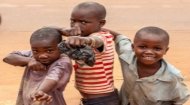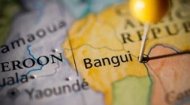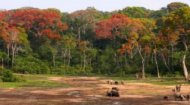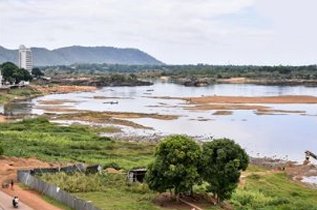|
Bangui Profile |
Bangui Profile |
Bangui Profile | Bangui Profile |
For information, videos and photos of the Central African Republic check out our CAR profile pages.
More >
|
|

Bangui City ProfileBangui's economic profile is the undisputed heart of the Central African Republic. Its port on the Ubangi River is vital, serving as the primary link for the landlocked nation to external markets via the Congo River system and the Atlantic Ocean. Most of the country's imports and exports, from timber and diamonds to consumer goods, pass through Bangui. The city is also the center for the nation's limited industrial activity, primarily light manufacturing such as breweries, textile mills, and soap factories. The vast majority of economic activity, however, revolves around trade, commerce, and the informal sector, with countless small businesses and vendors populating the bustling streets and markets.
Bangui is perhaps best accessed via the Bangui-Mpoko International Airport, however there is also a ferry service to the Democratic Republic of the Congo and roads linking the city to Chad and Cameroon. Whilst hardly a tourist destination of choice, should you ever end up in Bangui, maybe spend a little time checking out the Boganda National Museum located in the city centre which serves as the national museum of the CAR and has exhibits including the arts and traditions of country and can be found in a colonial villa in the Rue du Languedoc. Of particular interest is the section that explores the life of ethnic pygmy peoples. Also worth checking out are Notre-Dame of Bangui Cathedral and the Big Mosque which is somewhat shell shocked (literally) and often used as a refuge for those seeking shelter from the city's violence. There are also beer and coffee tours for the willing! Other notable landmarks in Bangui include the Presidential Palace, the Martyrs' Monument (commemorating those who died in the struggle for independence), and the city's Central Market, a vibrant nexus of commerce and social interaction, offers a sensory overload of sights, sounds, and smells, reflecting the daily lives of Bangui's residents. Watch the Bangui video profile (above left) for more insights into the city today as it gives a good look and feel of Bangui. Oh, and in the unlikely event you're a visiting tourist and get offered an African Grey parrot in Bangui, say no, or you'll be arrested and you really wouldn't want to spend time in a prison in the Central African Republic and certainly not in Bangui which, in a 2019 quality of living survey, came in second last place (230) out of 231 countries, second only to Baghdad in last position (231). |
 As with may busy cities, the streets are bustling with beggars and street vendors, selling everything from food, clothes, even cars and paintings all wrapped up in an run down environment laden with litter. Although predominately an administrative centre, there is some employment within the brewing and soap making industries together with the downstream port from where commodities are shipped including diamonds, cotton, timber, coffee, and sisal which produces a fibre widely used in rope making, mats, rugs, and brushes.
As with may busy cities, the streets are bustling with beggars and street vendors, selling everything from food, clothes, even cars and paintings all wrapped up in an run down environment laden with litter. Although predominately an administrative centre, there is some employment within the brewing and soap making industries together with the downstream port from where commodities are shipped including diamonds, cotton, timber, coffee, and sisal which produces a fibre widely used in rope making, mats, rugs, and brushes.



 Infrastructure in Bangui, while present, often faces significant challenges due to underinvestment and the impact of conflict. Road networks within the city and connecting it to other regions are often poorly maintained. Education is represented by institutions like the University of Bangui, the only public university in the country, which plays a crucial role in higher education despite resource constraints. Healthcare facilities, including hospitals, strive to serve the large urban population but frequently contend with limited resources and equipment.
Infrastructure in Bangui, while present, often faces significant challenges due to underinvestment and the impact of conflict. Road networks within the city and connecting it to other regions are often poorly maintained. Education is represented by institutions like the University of Bangui, the only public university in the country, which plays a crucial role in higher education despite resource constraints. Healthcare facilities, including hospitals, strive to serve the large urban population but frequently contend with limited resources and equipment.


